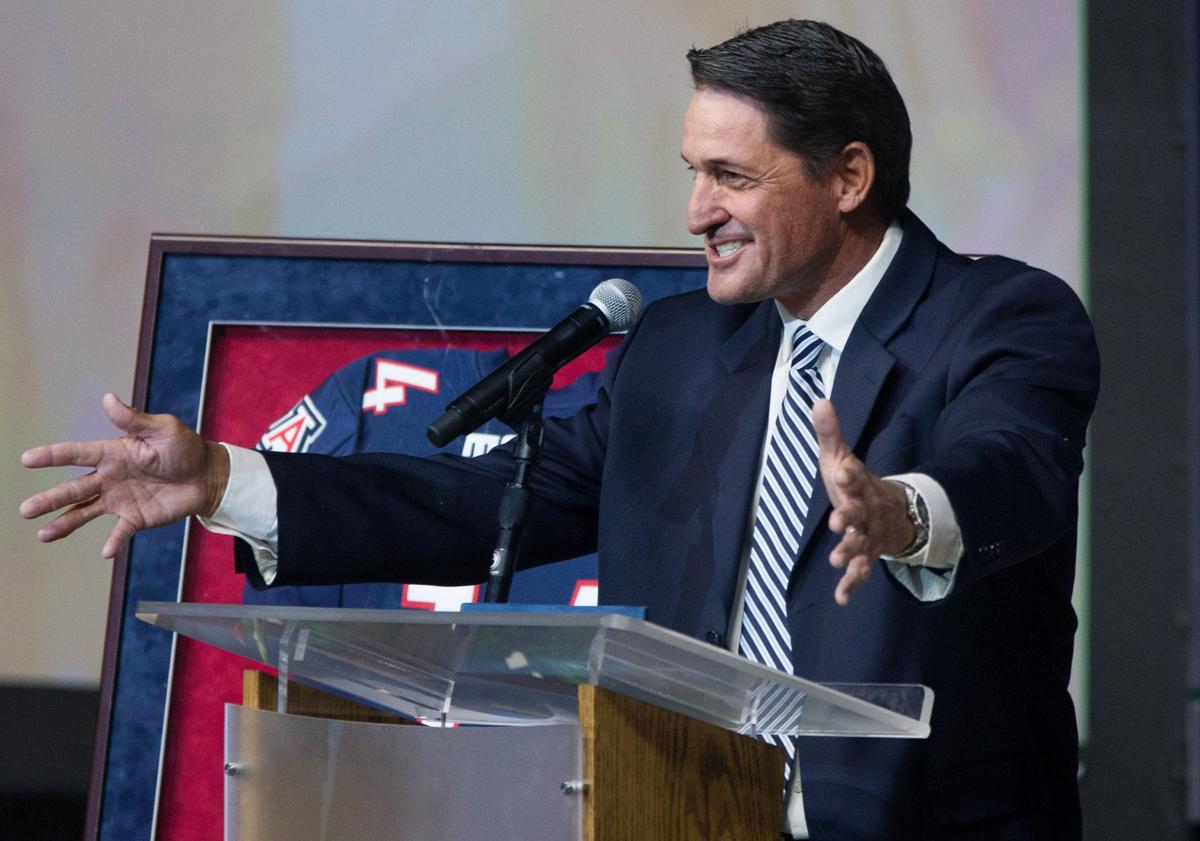Upon his return to Tucson in 2017, Chuck Cecil spent a few months at the guest house of a Tucson attorney, serving as an "analyst" on Rich Rodriguez’s final UA football team.
In college football, "analyst" is often a term for "outsider," a limited role with limited pay in which the analyst evaluates film and is not permitted to coach or recruit. In some places, it’s a speak-only-when-spoken-to role.
Let’s not sugarcoat this. For a man who coached in the NFL from 2001-16, the defensive coordinator of the Tennessee Titans in 2009 and 2010, Cecil was overqualified. But if he looked upon his analyst position as something beneath him, it didn’t show.
Cecil was so committed to his job that sometimes slept overnight in his office rather than return to his guest house a mere two miles from campus.
Once his wife and daughter joined him in Tucson, he stopped sleeping in the office, but his devotion to Arizona football wasn’t any different than it was from 1984-87 when he became a consensus All-American safety, the most feared tackler in Pac-10 football.
Although he steadfastly remained in the background, declining interview requests and refusing to show up the Wildcats’ full-time coaches, Cecil’s presence as an analyst was sometimes confounding.
Why wouldn’t Arizona give him a bigger role? Even if he had played college football at Rice or Rutgers, his energy, expertise and work ethic were all variables that seemed to be missing from Arizona’s long-struggling defensive coaching staff.
Finally, on Sunday afternoon, after a head-shaking string of ineffective defensive performances, Arizona coach Kevin Sumlin fired two of his old friends, linebackers coach John Rushing and defensive coordinator Marcel Yates.
Sumlin referred to Cecil as "a spark."
"What we want to do is give our players and fans a chance to win this season and get to postseason play," said Sumlin. "This is about eliminating some of the things that didn’t work."
But unlike Sumlin, who was hired with the security of a five-year contract, Cecil is serving on an interim basis. He is almost set up to fail. Bill Belichick would need far more than five weeks to turn around an Arizona defense that has struggled for 10 years.
Yet virtually every fan who walks through the turnstiles at Arizona Stadium for Saturday’s Homecoming game against Oregon State will surely have some sort of vision, big and small, that Chuck Cecil will immediately alter the trajectory of UA football.
Dream on.
He will have the same players on a unit ranked No. 119 of 130 in Division I football, yielding 470 yards per game. And remember this: half of the remaining games are against teams ranked Nos. 7 and 9 in the AP poll.
Arizona’s long dysfunctional defensive system, which has allowed 35 points per game, is ranked No. 118 in NCAA scoring defense.
Even an almost mythical local figure like Chuck Cecil isn’t going to be able to fix that in five weeks.
If Sumlin and UA fans view this as the start of a process to overhaul Arizona’s defensive system, it can work. But a quick fix? There’s no such thing, especially with Oregon and Utah on the schedule.
If Sumlin deserves any credit, it’s that he has finally recognized the systemic problems with Arizona’s defensive staffing and its attendant recruiting shortfalls. If he truly believes Chuck Cecil is the man to fix it — ultimately, the man who can also prolong Sumlin’s job — this will be a commitment of more than four games.
Do you understand how fully inept Arizona has been defensively since the Pac-12 was formed in 2011? The Wildcats are dead last. Here are the league’s worst total yardage figures yielded by Pac-12 teams from 2011-19:
• Arizona, 50,717 yards, 33 points per game.
• Arizona State, 46,922 yards, 29 points per game.
• UCLA, 46,882 yards, 29 points per game.
• Colorado 46,801 yards, 31 points per game.
• Cal, 46,508 yards, 31 points per game.
Even offense-first and recruiting-challenged Washington State has yielded over 6,000 fewer yards (44,416) than Arizona in that period.
Even beleaguered Oregon State has permitted 5,500 fewer yards than Arizona (45,222) in the Pac-12 years.
If Arizona loses to the Beavers on Saturday, Arizona will in effect become the Oregon State of Pac-12 football. For Cecil, there is a great risk.
I suspect that had Cecil called his NFL mentor Jeff Fisher, or received counsel from many of those he respects in the coaching business, they might’ve suggested he pass on the opportunity to dig his alma mater out of a decade-long defensive funk.
But that’s not Cecil. The 145-pound, 18-year-old walk-on who first suited up for the Wildcats in the fall of 1984, forged his way into the college football Hall of Fame by never giving an inch.
"This is a business for big boys," Sumlin said Monday.
It isn’t the first time Chuck Cecil has been asked to beat the odds.





